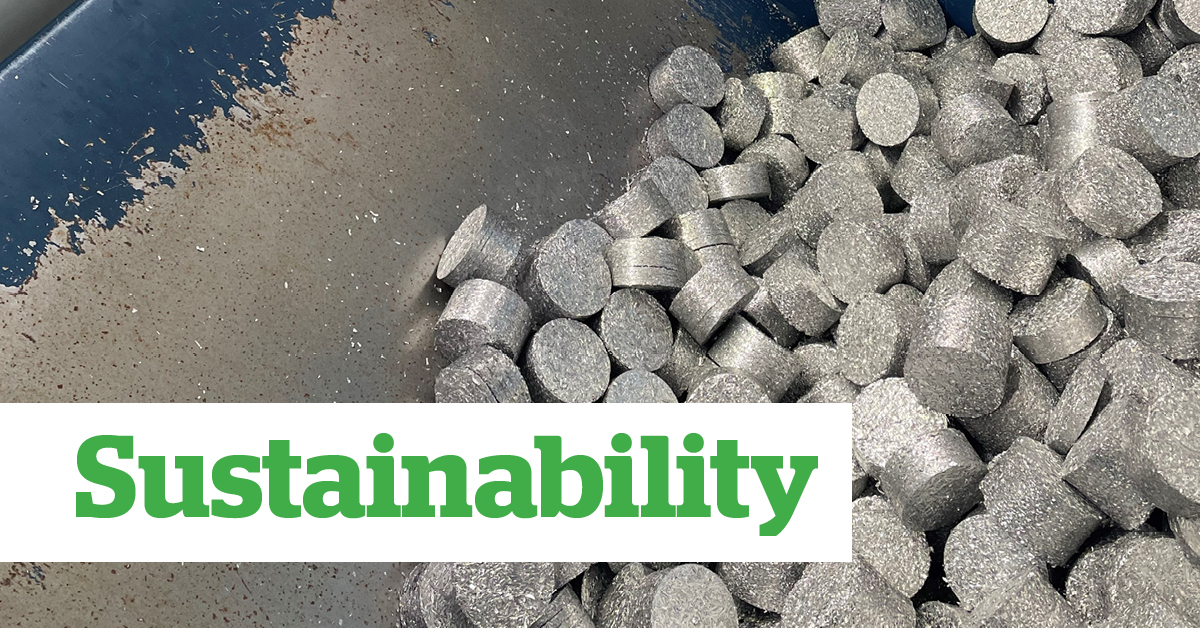As a leading manufacturer of aerospace components we produce a significant level of non-ferrous metal waste during machining processes, known as swarf. While a single piece swarf looks almost insignificant- a single piece of short swarf could be just a few mm and only 0.1mm in thickness) multiply it in the thousands and you can have a considerable amount of material piling up very quickly.
Recovering swarf produced during manufacturing process has long been a part of our efforts to operate a sustainable business. However, there are two issues we face when recovering swarf:
- Swarf can take up a considerable amount of space for a given weight. This requires us to devote more space to storage and time spent handling than is desirable.
- Retained Oils and Fluids. Machining components requires cutting oils and cooling fluid. Swarf retains these oils and fluids, so more has to be bought in to replace the lubricants now lost. The fluids present in the swarf then travel through storage and handling, pooling and staining containers which then need to be regularly cleaned – potentially putting these contaminants in water courses.
Paul Foulds, CEO of Middlesex Aerospace, expanded on the issue further. “We wanted to find a way to recover the fluids used in the machining processes for re-use, and reduce the amount of volume taken up by metal swarf. To achieve this we realised the best solution was to invest in two compacting machines reducing the volume of swarf and the amount of fluid the waste metal held.
Finding a solution to handling swarf and machining fluids.
After a period of research to ascertain the ideal equipment to suit our current and future levels of swarf production, we decided to bring in two compacting machines made by Jvonne in Italy.
Commitment to excellence
Jvonne, who opened their doors in 1986, have an excellent reputation for clamping and compacting solutions, and their high-quality standards approach mirrors our own commitment to excellence. The compacting units will handle up to 20Kg of alloy swarf per hour and deliver several key benefits to our manufacturing operations and sustainability objectives, including:
- Fluid/Oil Recovery. The compacting processes will allow us to significantly reduce the moisture content in swarf generated during manufacturing. Fluid retention has declined from a max of 30% by volume to an impressive 1% potentially achievable. The fluids can then be pumped back to our machines for re-use.
- Reduced storage required. The compacting process – which uses a hydraulic ram to force the swarf pieces together – reduces the volume of the material by up to 80%.
Great achievements
The Jvonne compactors were installed within Middlesex Aerospace’s facility and have handled their role of reducing swarf volume along with recovering fluids impressively. “Since installation we have seen the compactors make a real contribution to our sustainability efforts.” Said Paul. “We were determined to reduce the environmental impact of our use of machining fluids. Now, we recover and re-use most of the lubricating fluid previously lost in machining. And by compacting swarf into easy-to-handle blocks it has become far more efficient to handle and recycle. We’ve reduced not just the space needed to store it, but also the number of collections to take it away.“
- Easier handling. Swarf in its loose state is messy to handle, can take up a lot of time to move and needs continual cleaning up to prevent it spreading around a facility. By contrast, the compacting process turns the loose swarf into compressed shapes – briquettes -which can be handled easily and stored in containers, racking or free standing.
- Reduced emissions. As the high-volume swarf is turned into high-density briquettes, it means collection is faster and more efficient. Jvonne estimate the use of their compactors will reduce emissions from transporting away the swarf by 70-80%.
Efficiencies across our operations
The introduction of the two compactors will help us to achieve significant efficiencies across our operations and reduce our impact on the environment, benefits we believe our partners will appreciate and welcome the knock-on effect for them.
Read more about our sustainability initiatives and plans here

